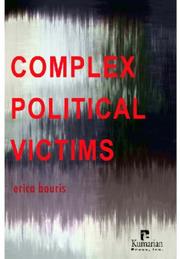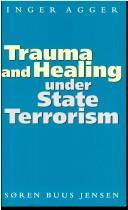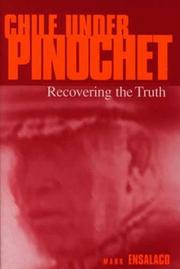| Listing 1 - 10 of 16 | << page >> |
Sort by
|
Book
ISBN: 0804785538 9780804785532 0804773920 9780804773928 0804773939 9780804773935 9780804773928 9780804773935 Year: 2013 Publisher: Stanford, Calif. Stanford University Press
Abstract | Keywords | Export | Availability | Bookmark
 Loading...
Loading...Choose an application
- Reference Manager
- EndNote
- RefWorks (Direct export to RefWorks)
After Stalin's death in 1953, the Soviet Union dismantled the enormous system of terror and torture that he had created. But there has never been any Russian ban on former party functionaries, nor any external authority to dispense justice. Memorials to the Soviet victims are inadequate, and their families have received no significant compensation. This book's premise is that late Soviet and post-Soviet culture, haunted by its past, has produced a unique set of memorial practices. More than twenty years after the collapse of the Soviet Union, Russia remains ""the land of the unburied"": t
Russian literature --- Grief in literature. --- Socialism and literature --- Collective memory and literature --- Victims of state-sponsored terrorism --- State-sponsored terrorism victims --- Victims of state terrorism --- Victims of terrorism --- Literature and collective memory --- Literature --- Literature and socialism --- History and criticism.
Book
ISBN: 1479874590 147986157X Year: 2018 Publisher: New York : Baltimore, Md. : New York University Press, Project MUSE,
Abstract | Keywords | Export | Availability | Bookmark
 Loading...
Loading...Choose an application
- Reference Manager
- EndNote
- RefWorks (Direct export to RefWorks)
Honorable Mention, 2019 Distinguished Book Award, given by the Sex & Gender Section of the American Sociological Association Honorable Mention, 2019 Marysa Navarro Book Prize, given by the New England Council of Latin American Studies (NECLAS)A profound reflection on state violence and women’s survivalIn the 1970s and early 80s, military and security forces in Argentina hunted down, tortured, imprisoned, and in many cases, murdered political activists, student organizers, labor unionists, leftist guerrillas, and other people branded “subversives.” This period was characterized by massive human rights violations, including forced disappearances committed in the name of national security. State terror left a deep scar on contemporary Argentina, but for many survivors and even the nation itself, talking about this dark period in recent history has been difficult, and at times taboo. For women who endured countless forms of physical, sexual, and emotional violence in clandestine detention centers, the impetus to keep quiet about certain aspects of captivity has been particularly strong. In Surviving State Terror, Barbara Sutton draws upon a wealth of oral testimonies to place women’s bodies and voices at the center of the analysis of state terror. The book showcases poignant stories of women’s survival and resistance, disinterring accounts that have yet to be fully heard, grappled with, and understood. With a focus on the body as a key theme, Sutton explores various instances of violence toward women, such as sexual abuse and torture at the hands of state officials. Yet she also uses these narratives to explore why some types of social suffering and certain women’s voices are heard more than others, and how this can be rectified in our own practices of understanding and witnessing trauma. In doing so, Sutton urges us to pay heed to women survivors’ political voices, activist experiences, and visions for social change.Recounting not only women’s traumatic experiences, but also emphasizing their historical and political agency, Surviving State Terror is a profound reflection on state violence, social suffering, and human resilience—both personal and collective.
Women --- Victims of state-sponsored terrorism --- Crimes against --- State-sponsored terrorism victims --- Victims of state terrorism --- Victims of terrorism --- Human females --- Wimmin --- Woman --- Womon --- Womyn --- Females --- Human beings --- Femininity
Book
ISBN: 1613240880 9781613240885 9781606928356 160692835X Year: 2009 Publisher: New York Nova Science Pub.
Abstract | Keywords | Export | Availability | Bookmark
 Loading...
Loading...Choose an application
- Reference Manager
- EndNote
- RefWorks (Direct export to RefWorks)
Victims of state-sponsored terrorism --- Reparation (Criminal justice) --- Immunities of foreign states --- Immunities of foreign sovereigns --- Jurisdictional immunities of foreign states --- Sovereign immunity (International law) --- State immunities (International law) --- Government liability (International law) --- Jurisdiction (International law) --- Privileges and immunities --- Sovereignty --- State-sponsored terrorism victims --- Victims of state terrorism --- Victims of terrorism --- Legal status, laws, etc. --- Law and legislation --- United States.
Book
ISBN: 9780804799782 9780804798488 0804799784 9780804799836 0804799830 0804798486 Year: 2016 Publisher: Stanford, California
Abstract | Keywords | Export | Availability | Bookmark
 Loading...
Loading...Choose an application
- Reference Manager
- EndNote
- RefWorks (Direct export to RefWorks)
Bodies of Truth offers an intimate account of how apartheid victims deal with the long-term effects of violence, focusing on the intertwined themes of embodiment, injury, victimhood, and memory. In 2002, victims of apartheid-era violence filed suit against multinational corporations, accusing them of aiding and abetting the security forces of the apartheid regime. While the litigation made its way through the U.S. courts, thousands of victims of gross human rights violations have had to cope with painful memories of violence. They have also confronted an official discourse claiming that the Truth and Reconciliation Commission of the 1990s sufficiently addressed past injuries. This book shows victims' attempts to emancipate from their experiences by participating in legal actions, but also by creating new forms of sociality among themselves and in relation to broader South African society. Rita Kesselring's ethnography draws on long-term research with members of the victim support group Khulumani and critical analysis of legal proceedings related to apartheid-era injury. Using juridical intervention as an entry point into the question of subjectivity, Kesselring asks how victimhood is experienced in the everyday for the women and men living on the periphery of Cape Town and in other parts of the country. She argues that the everyday practices of the survivors must be taken up by the state and broader society to allow for inclusive social change in a post-conflict setting.
Transitional justice --- Victims of state-sponsored terrorism --- Human rights --- Collective memory --- Post-apartheid era --- Collective remembrance --- Common memory --- Cultural memory --- Emblematic memory --- Historical memory --- National memory --- Public memory --- Social memory --- State-sponsored terrorism victims --- Victims of state terrorism --- South Africa. --- Commission for Truth and Reconciliation (South Africa) --- South African Truth Commission --- TRC --- Truth and Reconciliation Commission (South Africa) --- South Africa --- Politics and government --- Memory --- Social psychology --- Group identity --- National characteristics --- Victims of terrorism --- Justice

ISBN: 1626373116 1565492781 9781565492783 9781565492325 1565492323 Year: 2007 Publisher: Herndon Kumarian Press
Abstract | Keywords | Export | Availability | Bookmark
 Loading...
Loading...Choose an application
- Reference Manager
- EndNote
- RefWorks (Direct export to RefWorks)
* Reframes major events like South Africa's Truth and Reconciliation Commission, the Holocaust, and the war in Bosnia to take into account the "complex victim" * Calls for a more effective and encompassing support of all types of victims, especially those not typically recognized as such Images of the political victim are powerful, gripping, and integral in helping us makes sense of conflict, particularly in making moral calculations, determining who is "good" and who is "evil". These images, and the discourse of victimization that surrounds them, inform the international community when deciding to recognize certain individuals as victims and play a role in shaping response policies. These policies in turn create the potential for long term, stable peace after episodes of political victimization. Bouris finds weighty problems with this dichotomous conception of actors in a conflict, which pervades much of contemporary peacebuilding scholarship. She instead argues that victims, much like the conflicts themselves, are complex. Rather than use this complexity as a way to dismiss victims or call for limits on the response from the international community, the book advocates for greater and more effective responses to conflict. Erica Bouris is an assistant professor at Rollins College in the department of Political Science. Her teaching and research interests center on political victimization, post-conflict societies and the ethical dimension of international engagement with these issues.
Political persecution. --- Political violence. --- Political atrocities. --- Victims of state-sponsored terrorism. --- Human rights. --- Civil rights. --- Basic rights --- Civil liberties --- Civil rights --- Constitutional rights --- Fundamental rights --- Rights, Civil --- Constitutional law --- Human rights --- Political persecution --- Civil rights (International law) --- Rights, Human --- Rights of man --- Human security --- Transitional justice --- Truth commissions --- State-sponsored terrorism victims --- Victims of state terrorism --- Victims of terrorism --- Atrocities --- Violence --- Political crimes and offenses --- Terrorism --- Political repression --- Repression, Political --- Persecution --- Law and legislation
Book
ISBN: 9780299307639 0299307638 9780299307608 0299307603 Year: 2016 Publisher: Madison, Wisconsin : The University of Wisconsin Press,
Abstract | Keywords | Export | Availability | Bookmark
 Loading...
Loading...Choose an application
- Reference Manager
- EndNote
- RefWorks (Direct export to RefWorks)
Human rights --- Disappeared persons --- Victims of state-sponsored terrorism --- Collective memory and literature --- Collective memory --- Dictatorship --- Desaparecidos --- Missing persons --- State-sponsored terrorism victims --- Victims of state terrorism --- Victims of terrorism --- Literature and collective memory --- Literature --- Collective remembrance --- Common memory --- Cultural memory --- Emblematic memory --- Historical memory --- National memory --- Public memory --- Social memory --- Memory --- Social psychology --- Group identity --- National characteristics --- Absolutism --- Autocracy --- Tyranny --- Authoritarianism --- Despotism --- Totalitarianism --- History --- Argentina
Book
ISBN: 9781780680651 1780680651 Year: 2012 Volume: 51 Publisher: Cambridge : Intersentia,
Abstract | Keywords | Export | Availability | Bookmark
 Loading...
Loading...Choose an application
- Reference Manager
- EndNote
- RefWorks (Direct export to RefWorks)
Human rights --- Law of armed conflicts. Humanitarian law --- Disappeared persons (International law) --- Disappeared persons --- Victims of state-sponsored terrorism --- Legal status, laws, etc. --- Albania. --- State-sponsored terrorism victims --- Victims of state terrorism --- Victims of terrorism --- Desaparecidos --- Missing persons --- International law --- Legal status, laws, etc --- Disappeared persons - Legal status, laws, etc. --- Victims of state-sponsored terrorism - Legal status, laws, etc. --- Personnes disparues --- Convention internationale pour la protection de toutes les personnes contre les disparitions forcées (2005) --- Défense des droits de l'homme --- Enlèvement --- Etat --- Responsabilité (droit international)
Book
ISBN: 8373061533 9788373061538 Year: 2003 Volume: 251 Publisher: Lublin Towarzystwo naukowe katolickiego uniwersytetu Lubelskiego
Abstract | Keywords | Export | Availability | Bookmark
 Loading...
Loading...Choose an application
- Reference Manager
- EndNote
- RefWorks (Direct export to RefWorks)
Christian martyrs --- Catholics, Polish --- Poles --- Victims of state-sponsored terrorism --- 929 <438> --- 943.8 --- 282 <438> --- Biografie. Genealogie. Heraldiek--Polen --- Geschiedenis van Polen --- Katholieke Kerk. Rooms-katholieken--Polen --- 943.8 Geschiedenis van Polen --- 929 <438> Biografie. Genealogie. Heraldiek--Polen --- Polish people --- State-sponsored terrorism victims --- Victims of state terrorism --- Victims of terrorism --- Ethnology --- Martyrs --- Martyrdom --- Polish Catholics --- Christianity --- 943.8 History of Poland --- History of Poland --- Christian martyrs - Soviet Union - Biography - Dictionaries. --- Catholics, Polish - Soviet Union - Biography - Dictionaries. --- Poles - Soviet Union - Biography - Dictionaries. --- Victims of state-sponsored terrorism - Soviet Union - Biography - Dictionaries.

Abstract | Keywords | Export | Availability | Bookmark
 Loading...
Loading...Choose an application
- Reference Manager
- EndNote
- RefWorks (Direct export to RefWorks)
#SBIB:327.5H00 --- #SBIB:340H88 --- #SBIB:013.AANKOOP --- Strategie en vredesonderzoek: algemeen --- Internationaal recht: rechten van de mens --- Government, Resistance to --- Human rights advocacy. --- Torture victims --- Victims of state-sponsored terrorism --- Psychological aspects. --- Mental health --- Mental health. --- Psychological aspects --- Human rights advocacy --- State-sponsored terrorism victims --- Victims of state terrorism --- Victims of torture --- Advocacy, Human rights --- Civil resistance --- Non-resistance to government --- Resistance to government --- Victims of terrorism --- Victims --- Social advocacy --- National human rights institutions --- Political science --- Political violence --- Insurgency --- Nonviolence --- Revolutions --- Political resistance

ISBN: 0812235207 9786613211613 1283211610 0812201868 081221708X 0812235258 Year: 2000 Publisher: Philadelphia : University of Pennsylvania Press,
Abstract | Keywords | Export | Availability | Bookmark
 Loading...
Loading...Choose an application
- Reference Manager
- EndNote
- RefWorks (Direct export to RefWorks)
"When the army comes out, it is to kill."-Augusto PinochetFollowing his bloody September 1973 coup d'état that overthrew President Salvador Allende, Augusto Pinochet, commander-in-chief of the Chilean Armed Forces and National Police, became head of a military junta that would rule Chile for the next seventeen years. The violent repression used by the Pinochet regime to maintain power and transform the country's political profile and economic system has received less attention than the Argentine military dictatorship, even though the Pinochet regime endured twice as long.In this primary study of Chile Under Pinochet, Mark Ensalaco maintains that Pinochet was complicit in the "enforced disappearance" of thousands of Chileans and an unknown number of foreign nationals. Ensalaco spent five years in Chile investigating the impact of Pinochet's rule and interviewing members of the truth commission created to investigate the human rights violations under Pinochet. The political objective of human rights organizations, Ensalaco contends, is to bring sufficient pressure to bear on violent regimes to induce them to end policies of repression. However, these efforts are severely limited by the disparities of power between human rights organizations and regimes intent on ruthlessly eliminating dissent.
Victims of state-sponsored terrorism --- Disappeared persons --- Répression politique --- Victimes du terrorisme d'Etat --- Personnes disparues --- Gouvernement militaire --- Pinochet Ugarte, Augusto. --- Human rights --- Individuation (Psychology). --- Military government --- Political persecution --- Psychoanalysis --- Psychotherapist and patient. --- History. --- Philosophy. --- Droits de l'homme (Droit international) --- Répression politique --- History --- Histoire --- Chile --- Chili --- Politics and government --- Politique et gouvernement --- Basic rights --- Civil rights (International law) --- Rights, Human --- Rights of man --- Human security --- Transitional justice --- Truth commissions --- State-sponsored terrorism victims --- Victims of state terrorism --- Victims of terrorism --- Military rule --- Public administration --- Civil-military relations --- Military occupation --- Law and legislation --- Ugarte, Augusto Pinochet --- Pinochet, Augusto --- Pinochet U., A. --- Pinuoqi --- Pinochet Ugarte, Augusto --- Missing persons --- Human Rights. --- Law. --- Political Science.
| Listing 1 - 10 of 16 | << page >> |
Sort by
|

 Search
Search Feedback
Feedback About UniCat
About UniCat  Help
Help News
News